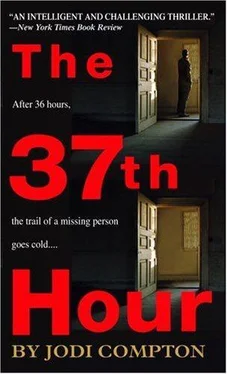After a moment even unshakable Genevieve looked up at the opposite corner of the room and rubbed the side of her nose with one finger, the embarrassed way people do when they’re hearing a conversation they’d rather not. I stood up, in hopes of illustrating to Tom that Genevieve and I needed to leave, now that the situation had obviously resolved itself.
“Look, I gotta go,” Tom said. “I’ll come get him. No, I’ll come. Just stay there.”
He hung up and walked back to us, shaking his head darkly. “Denise’s mother,” he said. “I can’t believe it. No, I can believe it. It just kills her that I got custody. She can’t handle it.”
He filled us in on the details: he and his mother-in-law had recently had a debate about young Jordy’s hairstyle. From this debate, she had apparently incorrectly inferred that she had permission to drive up from Burnsville, where she lived, pick Jordy up after school, and take him to the barber. “I told her no, flat out, but of course she says I said yes,” Tom said.
I say that Tom told both Genevieve and me this story, but his behavior was interesting to observe. He’d started out by directing his comments to me. Maybe it was because I was closer to his age, maybe it was because I was more visibly the regular visitor to a gym and therefore some kind of kindred spirit, maybe it was simply my ringless finger. But as I gave no encouragement to his airing of grievances, he correctly began identifying Genevieve as the more sympathetic pair of ears, probably because she was at least nodding in the right places. Gradually his attention and eye contact shifted. It was to Genevieve that he told the backstory: a history of meddling by the former mother-in-law, unwanted advice, veiled jabs at his child-rearing skills.
Finally, when his attention seemed solely on my partner, I drifted out of his line of sight and looked out the window at the parking lot, where a trio of warmly dressed kids were practicing free throws on one of those freestanding basketball hoops with a weighted base you can buy at sporting-goods stores. They were sure going to learn an unpleasant lesson, I thought, when they started playing on a court with a regulation-height hoop.
“Gen, we really should go,” I said.
But Genevieve was a soft touch. “Listen,” she told Tom kindly, “I know you wouldn’t want to press any sort of charges, but it might be good if my partner and I had a talk with your mother-in-law about the seriousness of taking someone else’s child without explicit prior permission.”
Behind Tom’s back, I scowled at Genevieve and shook my head. Genevieve ignored me, but fortunately, her offer wasn’t accepted.
“Nah,” Tom said, shaking his head. “It won’t help. She’ll just insist I gave her permission. She’ll even tell you that she specified that she’d do it today and that I agreed. Thanks for the offer, though.”
I was relieved, but Tom wasn’t quite through with us yet. On our way out, he tried to sell Genevieve a home juice machine. Genevieve declined, but Tom pressed a card with his phone number on it into Gen’s hand, “in case you change your mind.”
As soon as Genevieve started the car, I said, “What did you think you were doing back there, volunteering the two of us to drive down to Burnsville to listen to the other end of that extremely tedious family squabble?”
Genevieve was unfazed. “It might have been interesting. Aren’t you the least bit curious about whether the grandmother was an old battle-ax, as described? What if we found her to be gracious and reasonable and entirely in the right?” She accelerated slightly to merge with the traffic on the road.
“You mean, like the gracious, reasonable people we always deal with on the job?” I said. “Even if she was, I still don’t think driving down to Burnsville would have been the best use of the county’s time.”
“It would have been proactive policing,” Genevieve said, adopting a pedantic tone. “Would you rather have to straighten things out again, the next time grand-mère decides to borrow Jordy again without asking?”
I had no answer for that, and we fell silent for the rest of the trip.
But when we were back at our desks downtown, Genevieve said, “Hey, what were you laughing about back there?”
“At Tom’s place? I didn’t laugh,” I said. “I thought I kept a very straight face when he finally realized where his kid was.”
Genevieve rolled a leaking pen against a piece of scratch paper and then, dissatisfied, capped it and threw it in the trash. “Not then. A couple of minutes before that, when we were in his kitchen. I looked over at you and I could see you were trying really hard not to laugh at something. I had to distract the guy so he wouldn’t see.”
I thought. “Oh, that,” I said. “You didn’t see the sign on the refrigerator?”
“What sign?”
“He had a sign on his refrigerator, for those herbal weight-loss supplements, that said: ‘I lost 60 pounds. Ask me how!’ ” I was almost laughing now, remembering it. “That cheery little sign was right in my line of sight, and I couldn’t help it, I kept thinking of his kid.”
Genevieve looked blank.
“A six-year-old weighs about that much. I lost 60 pounds.”
Understanding, Genevieve shook her head. “Your sympathy really bleeds sometimes. For all you knew, his son could have been picked up by a pedophile and-”
“Bullshit. You knew as well as I did from the moment we walked into his apartment that his son was fine. For a couple of minutes,” I said, “I seriously suspected the kid was lost among all those boxes of juice machines in the living room.”
Genevieve gave me her serene smile. “You’re just upset that he didn’t like you well enough to try to sell you a juice machine.”
“Damn straight he didn’t,” I said. “And you know why? People know better than to try that shit with me. What is it with people and these home-sales things?”
“Oh, good,” she said, “we’re off on a rant now.”
“Well, come on,” I complained, “people actually believe the ‘get-rich-working-from-home’ ads in the back of magazines. But who do they end up trying to sell this stuff to? The people around them. Neighbors, family. I mean, is that really salesmanship? What happens when you run out of friends?”
Genevieve gave me a look. “That would take some of us less time than others.”
It took me a moment to realize what she was saying. Then I winced. “Gen, sometimes you are so mean to me, I swear it almost feels good.”
She was unapologetic. “I’m just saying, the home-sales work probably gives a single father like Tom more time to be home with his son,” Genevieve said tolerantly. “Besides, it’s the American dream. Everyone wants to be their own boss.”
“Not me,” I said. “I’m happy with my lot in life: working for you.”
“Oh, please,” Genevieve said. “I do all the heavy lifting in this partnership. Like covering up for you when you’re on the verge of cracking up in the middle of an interview situation in someone’s kitchen.” She turned away from me and typed steadily.
I wasn’t ready to quit provoking her, though. “Genevieve?” I said.
“Yes?” But she didn’t turn around to look at me. At least not right away. But in a moment the silence got to her and she swiveled her chair to look at me. “What?” she said.
“I lost sixty pounds.”
Genevieve turned away again, but too late; her shoulders were shaking. She was laughing. I’d gotten her.
A lot of people would have frowned, I suppose, but cop humor is frequently dark. It doesn’t affect the way you do your job.
“You just wait,” Genevieve said. She was smiling, but she pointed a didactic, warning finger at me. “You wait until you’ve got a kid of your own. Then you’ll understand. You’ll want to go out to Edina and apologize on your hands and knees to that guy.”
Читать дальше












